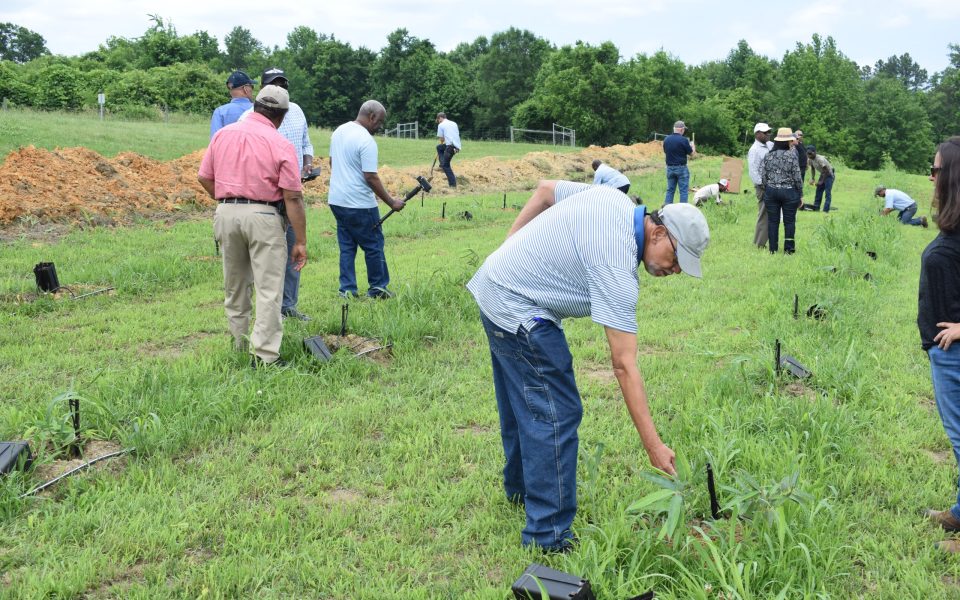Bamboo has a reputation: an ever-metastasizing nuisance; a third-world weed; “the poor man’s timber.” But it wasn’t always like this. River cane — one of three bamboo varieties native to the American southeast — once flourished along Carolina riverbeds and across vast, dense acreages known as canebrakes.
“As a part of the colonization of America, European settlers fed their cattle on the giant timber bamboo because it was the most nutritious thing, outcompeting and driving the buffalo away, which was itself part of the effort to eradicate native people, the Cherokee in this region in particular,” farmer Everest Holmes says. Currently a mushroom farmer outside Asheville, he finds himself among a younger generation of farmers seeking to rethink the hows and whys of small-scale agriculture.
“To me, [bamboo] is the epitome of regenerative farming because it lives for so long and is good for the environment, producing three times more oxygen than any other plant,” Holmes says. “You’re getting a timber product, a food source and a potential agro-tourist attraction.”
On May 24, he found himself walking NC A&T State University’s farmland as the College of Agriculture and Environmental Sciences at A&T co-hosted a free workshop on cultivating bamboo as a cash crop, along with OnlyMoSo USA Corps, a sales and consulting company focused on the creation and maintenance of bamboo plantations. OnlyMoso pitched to around two dozen convening farmers from across the Carolinas and Virginia. Importing bamboo seeds and plants from abroad is illegal in the United States, but private companies filled the resource gap in the decades since the US Department Agriculture’s bamboo program went dark in the early ’70s as the country focused on corn, wheat and soy, and made big shifts in production, moving towards the factory-farm model. David Benfield, a bamboo consultant and co-founder of Brightside Bamboo, the largest bamboo nursery in the Carolinas, attended. He says there are several species highly suitable for commercial farming in North Carolina.
“We typically think of bamboo as an Asian plant, and it’s not — there’s bamboo native to every continent except Europe,” he says. “We share roughly the same latitude and the same climate as China, which is where these specific species are native. North Carolina — really the whole southeastern United States, and the parts of China where it grows are like the two best areas in the world to grow this type of bamboo.”
Bamboos are evergreen perennial flowering plants known to reduce soil erosion on river banks and shorelines. Among hundreds of species are the fastest-growing woody plants in the world, diverse enough to provide ideal material for everything from construction and flooring to clothing, arts and crafts. Its timber is lightweight and flexible but touts a higher compressive strength than brick or concrete and resists tension nearly as well as steel. It’s antibacterial and antifungal properties make it ideal for botanical extracts, teas, medicine and livestock forage. It’s an excellent source of nutrition for people, too, carrying one of the highest concentrations of protein of any vegetable and significant doses of fiber, potassium and trace minerals.
What’s most appealing? Farmers won’t need to reach for pesticides or herbicides, and these perennials require little maintenance. When it’s time to harvest, a small shovel or asparagus harvesting tool will do. According to the US Department of Agriculture, the average age North Carolina farmers is 59, a number that’s been inching upward for decades. A lightweight crop that doesn’t require heavy machinery sounds alright to most who till the land.[pullquote]Learn more at brightsidebamboo.com and onlymoso.com.[/pullquote]
“What appeals [to me] is that you don’t have to replant it,” says Réne Barber, who wants to revive acres of farmland passed down from her grandfather in Hillsborough, just east of Greensboro. “I see bamboo as a product of the future. Anything green, anything less caustic to the environment and cost-effective. I see it as a product that can have even beyond the 1,500 uses that it has other than just eating and flooring and things like that. I see it as a product that industry would use in the long term and we can use it for lots of people in society whether it’s food or housing or clothing, you can help a lot of people.”
Benfield contends that the hardy crop could be the best move for farmers around Winston-Salem where tobacco reigned supreme for decades if not centuries.
“It’s not a great time to be a farmer, but bamboo is a terrific substitute for some of our traditional economies that’ve gone away, specifically tobacco, because it works well in a system where people are working together,” Benfield said.
That’s an important note: Small-scale farmers will need to effectively start their own business selling to regional restaurants. And one of the biggest selling points for companies like OnlyMoso is that they’ll pick up your crop and sell it for you.
“I think that the US market has not probably discovered how useful bamboo can be yet,” Barber says. “I think this is a ground floor.”
The soil is ready, and the seeds planted; whether or not these woody shoots are to become the Southeast’s next cash crop, though, rests in the eyes of the farmer, the capitalist and the consumer.
Join the First Amendment Society, a membership that goes directly to funding TCB‘s newsroom.
We believe that reporting can save the world.
The TCB First Amendment Society recognizes the vital role of a free, unfettered press with a bundling of local experiences designed to build community, and unique engagements with our newsroom that will help you understand, and shape, local journalism’s critical role in uplifting the people in our cities.
All revenue goes directly into the newsroom as reporters’ salaries and freelance commissions.


Leave a Reply